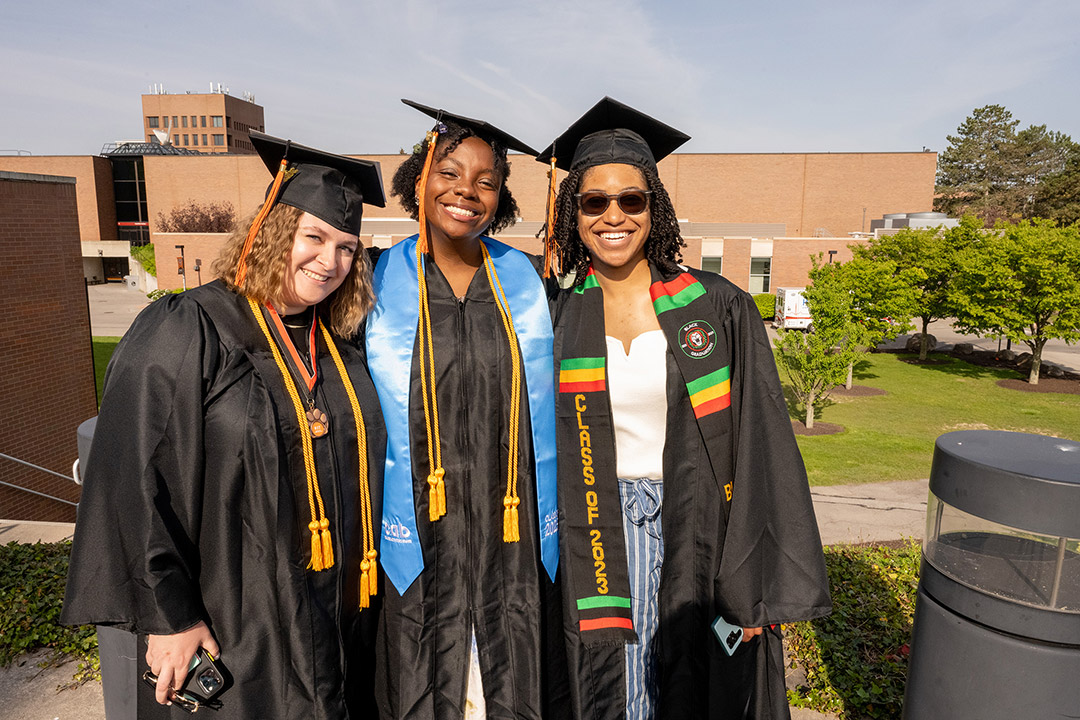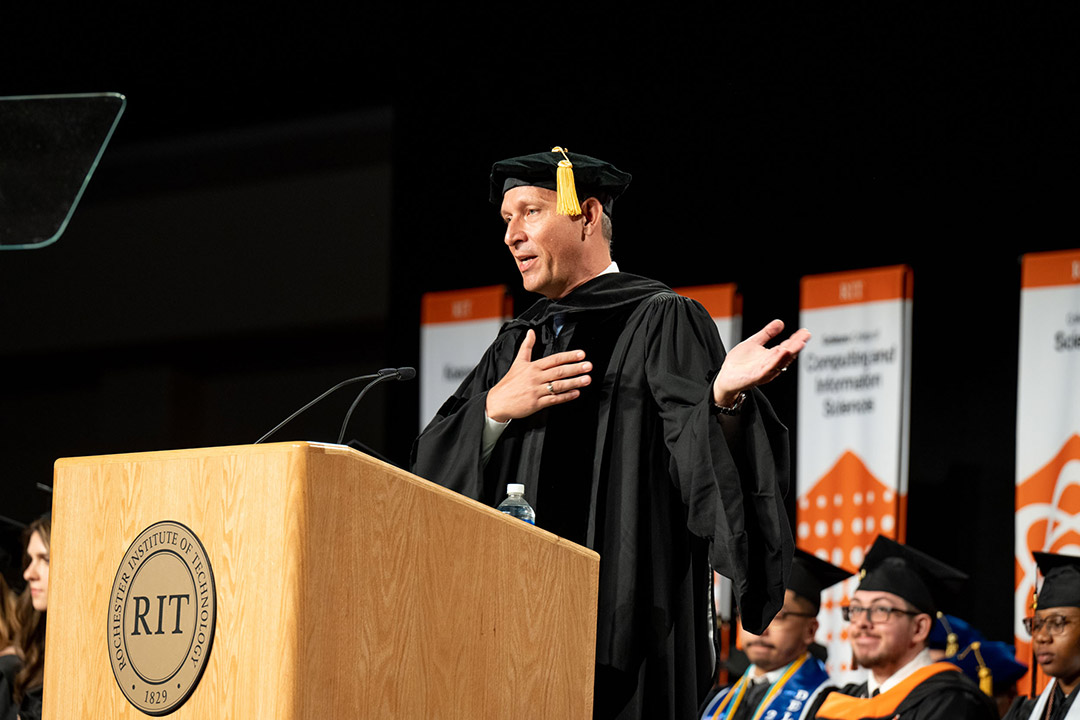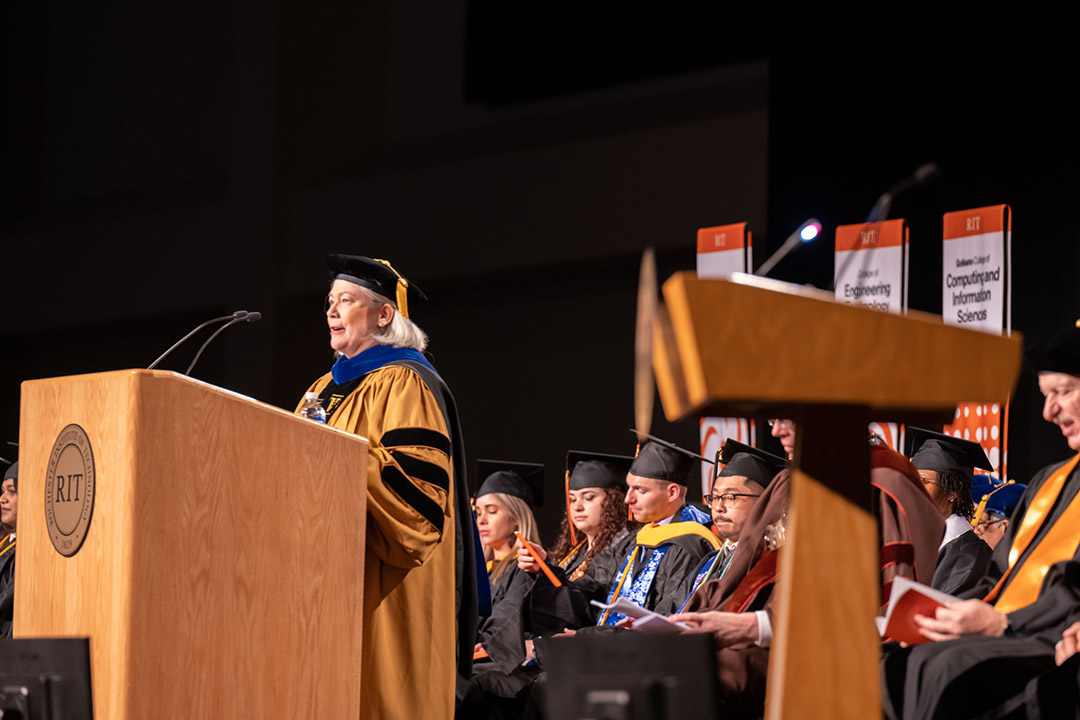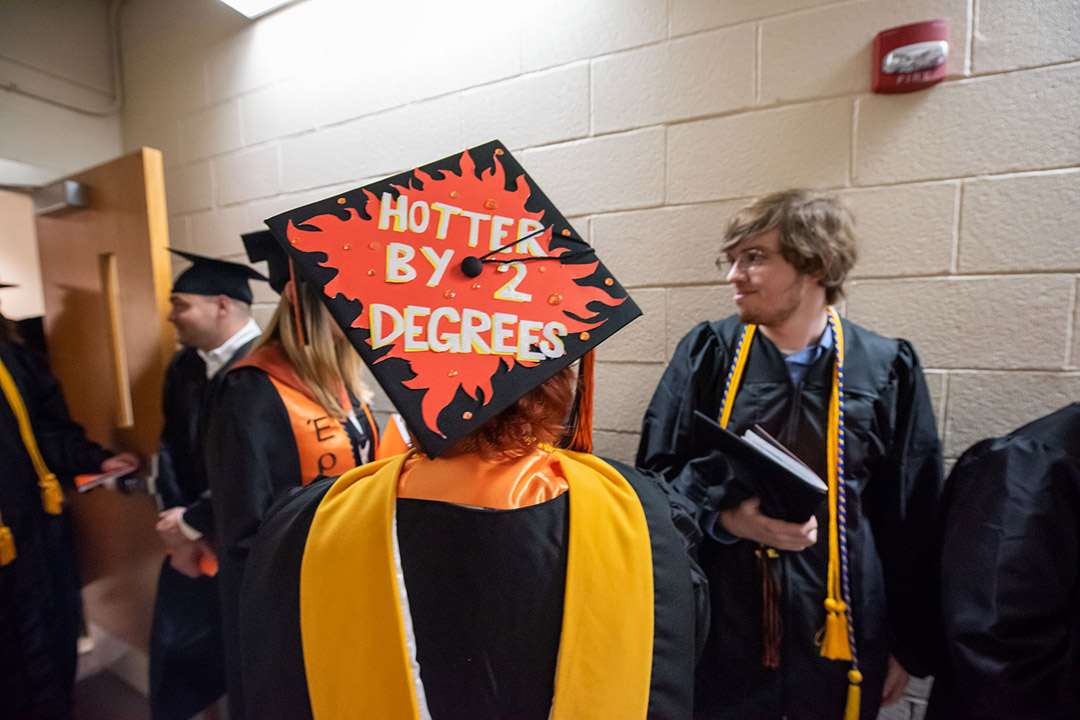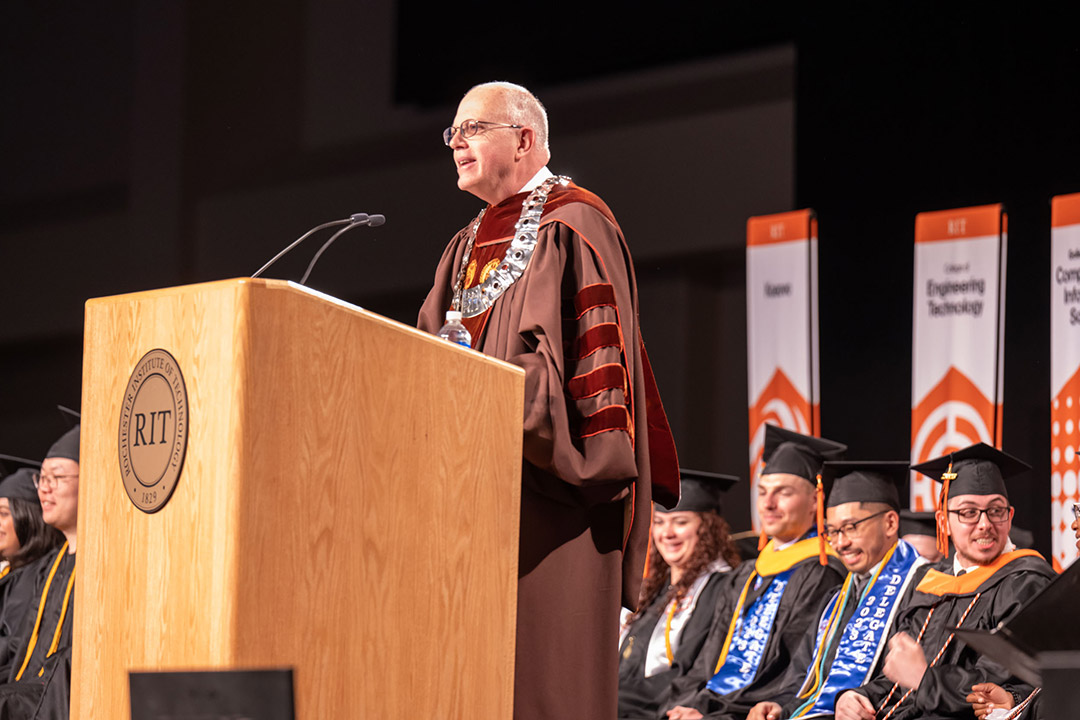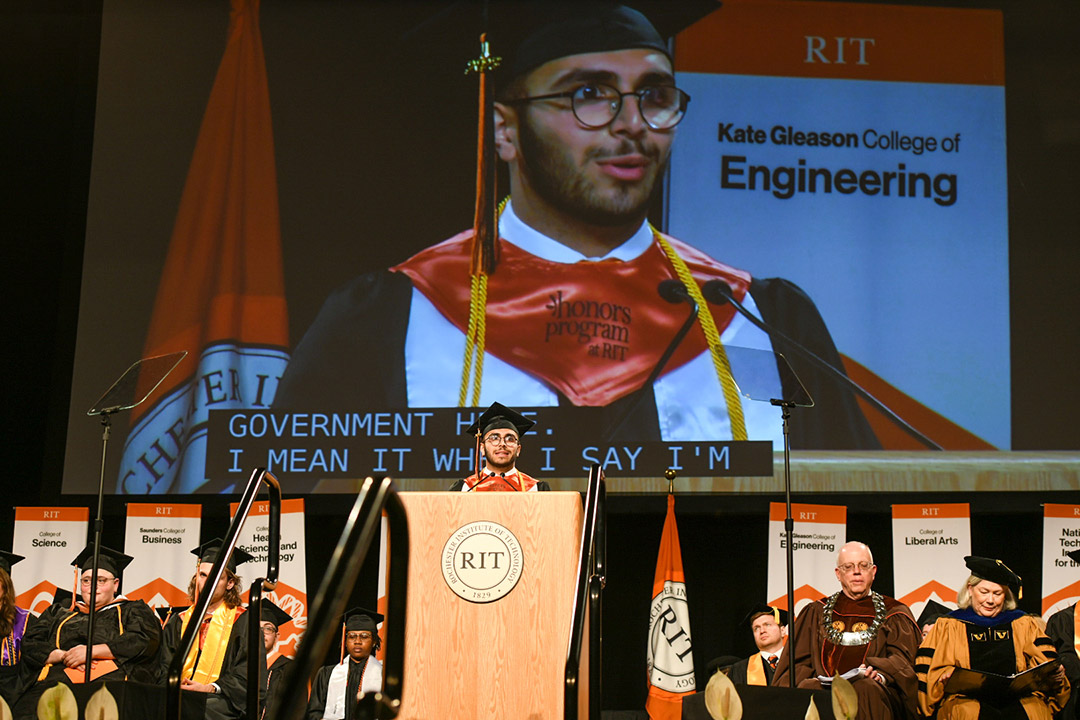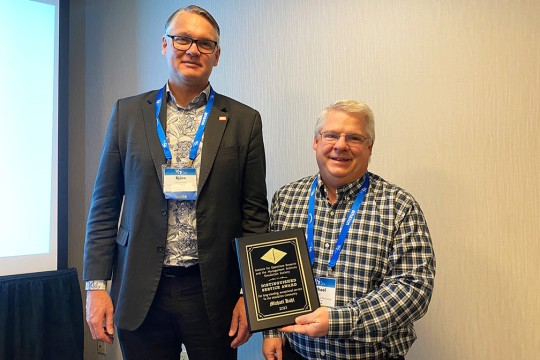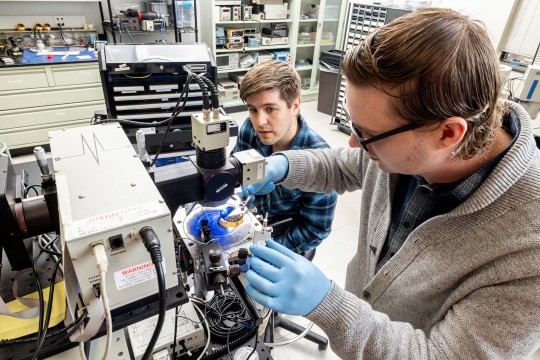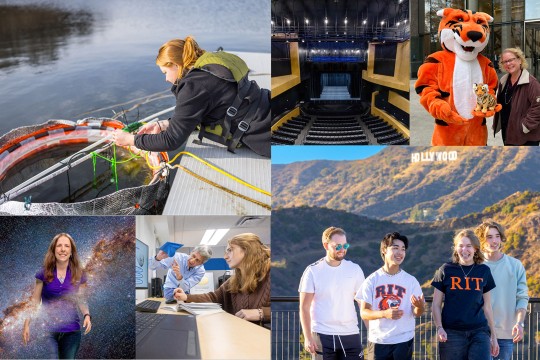RIT grads told to hold on to hope and work hard to make it happen
More than 4,800 academic degrees awarded this year
Scott Hamilton
From left to right, Charlotte Bischof, Autumn Mack, and April Roberts were among more than 4,800 outstanding graduates celebrated during RIT’s 138th commencement ceremony May 12. “RIT is a small city and I will truly miss the sense of community that I found here on campus,” said Mack, who earned her bachelor’s degree in film and animation.
A former top NASA administrator told graduates of Rochester Institute of Technology that their futures may seem as ambiguous as outer space. But by daring to do mighty things with hope instead of fear, untold possibilities will come into focus.
Photo gallery
See a collection of photos from commencement weekend.
“Don’t worry so much about a grand master plan for your career and your life,” said Thomas Zurbuchen, astrophysicist and the longest continually serving associate administrator for the Science Mission Directorate in NASA’s history. “Bet on hope. Listen to the universe. Find opportunities to work with, and learn from, those who bring different skills and experience to the table.”
Scott Hamilton
Thomas Zurbuchen, astrophysicist and the longest continually serving associate administrator for the Science Mission Directorate in NASA’s history, was the keynote speaker at RIT’s commencement ceremony May 12. During his talk, Zurbuchen encouraged graduates to “bet on hope and listen to the universe.”
That was the message keynote speaker Zurbuchen gave to more than 4,800 RIT graduates during today’s Academic Convocation in the Gordon Field House and Activities Center. The number of graduates includes students throughout this academic year as well as those attending RIT’s global campuses in China, Croatia, Dubai, and Kosovo.
Individual college commencement ceremonies honoring the graduates will continue through the weekend, including a hooding ceremony today for a record 69 people receiving Ph.D. degrees.
Photo gallery
At this morning’s ceremony, five honorary degrees were awarded, including to keynote speaker Zurbuchen.
Zurbuchen oversaw some of the NASA’s most important research initiatives and programs, including the historic Mars 2020 mission, landing the rover Perseverance, and the small robotic helicopter Ingenuity, as part of NASA’s Mars Exploration Program. He is also credited with leading the launch of the James Webb Space Telescope, the images from which are reshaping our understanding of our own galaxy and beyond.
Scott Hamilton
Ellen Granberg, provost and senior vice president for Academic Affairs, served as master of ceremonies for RIT’s commencement ceremony May 12.
He said he came to tears last July as he stood alone in a nearly empty room and stared at a startling image of the universe from the Webb telescope, using infrared light for the first time.
“I was in awe,” he said. “I was looking at the deepest image of space ever captured, something that only a handful of other scientists had yet seen. I saw the universe anew.”
He said some of the light in the image he saw had taken more than 13 billion years to get to the telescope. It is the most complex and most expensive space mission ever undertaken. It took six years and more than $1 million a day to build.
“As I stood there, I noticed that my eyes were welling up. The sense of awe was almost too much for one person,” he said.
As a child in Switzerland, Zurbuchen often stared at the skies, but was told that science would be too hard for him to pursue.
Scott Hamilton
Individual college commencement ceremonies honoring the graduates will continue through the weekend.
He vividly recalls witnessing the Webb telescope being launched from French Guyana, and during his speech, showed a video of it heading to the heavens.
“People were in tears all around me, some having put two decades of work into the telescope project,” he said. “I felt relief and great hope. I thought back to that little kid on the roof of the farm looking at the dark sky and dreaming. And now that same first-generation college student and his team were making history beyond any expectation.”
The lesson, he said, is that people need to recommit to hope on a regular basis, despite facing failure as a possibility.
“Fear and hope are often neighbors,” Zurbuchen said. “Know that, and then do your best anyway. Anthropologist Jane Goodall warned us about the absence of hope when she said that ‘the greatest danger to our future is apathy.’ The decision whether to be hopeful is up to us, each day. And so is the courageous decision to act on that hope, and work hard to make it happen.”
Scott Hamilton
RIT President David Munson addressed more than 4,800 graduates, their family members and guests, and faculty at the university’s 138th commencement ceremony in the Gordon Field House on May 12.
RIT President David Munson congratulated the graduates, and their families, and friends who supported them.
“Each graduate in this audience has an amazing story behind their journey, culminating in this moment,” Munson said. He said many students were blessed with multiple job offers, many will seek higher degrees, and others will serve in the military or service organizations such as the Peace Corps.
Munson called this “an extraordinary time for RIT with our amazing community of creators and innovators.” He said RIT alumni have the benefit of innovative learning, leveraging their backgrounds in technology, the arts, and design that “produce graduates in every discipline capable of practicing transformative innovation that serves the greater good.
“Today’s world needs people who know how to create and innovate, analyze and implement, collaborate and lead. We represent creativity and innovation in all fields, with a strong culture of making. We make things that never existed before, whether those things are physical objects, digital media, new processes, or breakthrough concepts or ideas. And, we put those things into use.”
Munson told the graduates that their success is not measured by material wealth or prestige. “It is my hope that you wake up tomorrow not solely focused on how to earn a living. Rather, that you go out and do your best to enrich the world. Indeed, RIT alumni — now more than 145,000 strong with you included — are emblematic of goodness.”
Student Government President Aditya Khanna called his college years the best chapter of his life so far.
Elizabeth Lamark
Student Government President Aditya Khanna, who earned his bachelor’s degree in computer science, called his college years “the best chapter of his life so far.”
“I loved running through dorm tunnels playing sardines, bringing an entire Christmas tree into our common room and decorating it as a floor, every Ultimate Werewolf game that always got a little too personal, I loved messing around with virtual backgrounds when I couldn’t pay attention to Zoom anymore, and boy did I love being your Student Government president this year,” he said.
Khanna said this class specifically has learned how to be innovative both in and out of the classroom and combine passions with education to make a genuine impact.
“We had an entire pandemic sandwiched into our college experience,” he said. “Being an RIT student means you get to experience college differently, whether you went on co-op or your friends did, we all had to constantly adjust to new environments and make the most of it. Being an RIT student means being part of a community of intellect, compassion, and unity.”
Khanna said he is excited about the new chapters that lie ahead in life, and admitted he’s a little nervous about them.
“But once upon a time, college was the new chapter of our life,” he said. “And so our story isn’t over yet, rather it’s just getting started. ... Tigers, congratulations, be proud and hold your heads high as you embark on your next adventure, remembering that the skills and knowledge you have gained here will serve you well as you navigate the challenges and opportunities ahead. Go forth and make your mark on the world, knowing that you have the power to create positive change and leave a lasting legacy.”
Read the speeches
The full text of the speeches by President David Munson, keynote speaker Thomas Zurbuchen, and Student Government President Aditya Khanna are available.



